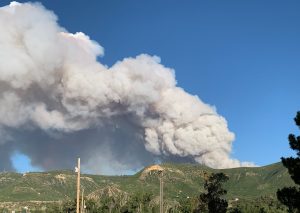The Montezuma County Office of Emergency Management (OEM) is an office at the local level that holds the responsibility of comprehensively planning for and responding to and recovering from all manner of disasters, whether man-made or natural. An OEM may also be requested to provide consequence management for large special events such as major gatherings, visiting dignitaries, etc.
Responsibilities include coordination and collaboration efforts between all local, state, and federal government entities, non-government organizations, local businesses and the county citizens. This is accomplished by maintaining a county emergency operations plan (EOP) and a Hazard Mitigation Plan (HMP), participating in local and regional workgroups, planning and coordinating emergency training and exercises, and supporting public education in emergency preparedness.
During a disaster the Office of Emergency Management assists in coordinating the response effort with local and state agencies, non-government agencies, local businesses and other organizations. After the disaster the Office of Emergency Management coordinates and assists with the recovery efforts to restore our community.
Prevention, mitigation, preparedness, response, and recovery are the five steps of Emergency Management.
Prevention: Prevention is the action taken to decrease the likelihood that an event or crisis will occur. Prevention focuses on preventing human hazards, primarily from potential natural disasters or terrorist (both physical and biological) attacks. Preventive measures are designed to provide more permanent protection from disasters; however, not all disasters can be prevented.
Mitigation: Hazard mitigation reduces the loss of life and property by minimizing the impact of disasters. This begins with state, tribal, and local governments identifying natural disaster risks and vulnerabilities that are common in their area. After identifying these risks, they develop long-term strategies for protecting people and property from similar future events. Mitigation plans are key to breaking the cycle of disaster damage, reconstruction, and repeated damage.
Preparedness: Disaster preparedness planning involves identifying organizational resources, determining roles and responsibilities, developing policies and procedures, and planning activities in order to reach a level of preparedness to be able to respond timely and effectively to a disaster should one occur.
Response: Emergency response includes any systematic response to an unexpected or dangerous occurrence. The goal of an emergency response procedure is to mitigate the impact of the event on people and the environment.
Recovery: Recovery consists of those activities that continue beyond the emergency period to restore critical community functions and begin to manage stabilization efforts. The recovery phase begins immediately after the threat to human life has subsided. Recovery operations are an extremely important phase in the Emergency Management continuum and yet one that is often overlooked. The Incident Command System team is responsible for the implementation of the Recovery phase.
Possible disasters for Montezuma County include, but not limited to:

The Montezuma County Emergency Operations Plan (EOP) outlines how county public safety agencies and organizations will implement life and property saving actions when a major disaster or emergency challenges our ability and our resources to respond effectively. Priorities during an event are to save lives, protect public health, protect property, protect the environment, and to restore the community. The EOP describes policies, planning assumptions, concept of operations, response and recovery actions. Responsibilities of each Montezuma County department and agency are identified to guide operations in preparation for and following a major disaster or emergency.
Available for Public Review.
Would you like to learn more about what Montezuma County is doing to minimize the impacts of wildfires, floods, landslides, and other hazards? The plan assesses risks posed by natural hazards, identifies ways to reduce those risks, and allows the County to be eligible for mitigation funding from FEMA. A Hazard Mitigation Planning Committee (HMPC) consisting of representatives from various county departments, the municipalities including Cortez, Mancos, Dolores, and the Cortez Fire Protection District developed the plan update over the past 18 months with assistance from a consultant and input from stakeholders and the public. The plan identifies hazard mitigation goals and a variety of mitigation projects with the intent of reducing losses from hazard events before they occur again. The plan can be accessed at the following website:
For more information, contact:
Jim Spratlen
Emergency Manager
109 W. Main St., #115,
Cortez, CO 81321
The CWPP has been prepared to assist Montezuma County residents, local governments and land management agencies for the following primary purposes;
Please feel free to click on this link and review our current CWPP.

